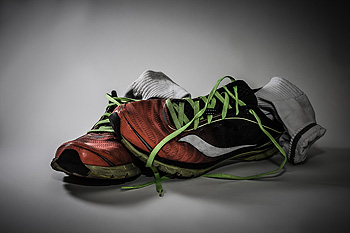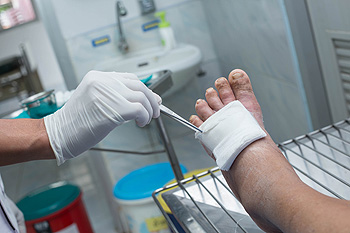 If you have noticed excessive sweat coming from your feet, you may have a medical condition that is known as plantar hyperhidrosis. It can occur as a result of an overactive nervous system, obesity, or a thyroid disorder. There are disadvantages to having this condition, including slipping in open shoes that may cause the to twist, or the foot slipping off the brake while attempting to stop the car. There are treatment options that do not require surgery which may help to obtain mild relief. These can include taking anti-anxiety drugs, botox injections, or taking specific medications that can induce drying. For severe cases, surgery may be a viable option which can include cutting the affected nerve. If you are suffering from this uncomfortable condition, it is strongly advised that you speak to a podiatrist who can offer the best treatment for you.
If you have noticed excessive sweat coming from your feet, you may have a medical condition that is known as plantar hyperhidrosis. It can occur as a result of an overactive nervous system, obesity, or a thyroid disorder. There are disadvantages to having this condition, including slipping in open shoes that may cause the to twist, or the foot slipping off the brake while attempting to stop the car. There are treatment options that do not require surgery which may help to obtain mild relief. These can include taking anti-anxiety drugs, botox injections, or taking specific medications that can induce drying. For severe cases, surgery may be a viable option which can include cutting the affected nerve. If you are suffering from this uncomfortable condition, it is strongly advised that you speak to a podiatrist who can offer the best treatment for you.
If you are suffering from hyperhidrosis contact Brent Harwood, DPM of Southeast Podiatry. Our doctor can provide the care you need to attend to all of your foot care needs.
Hyperhidrosis of the Feet
Hyperhidrosis is a rare disorder that can cause people to have excessive sweating of their feet. This can usually occur all on its own without rigorous activity involved. People who suffer from hyperhidrosis may also experience sweaty palms.
Although it is said that sweating is a healthy process meant to cool down the body temperature and to maintain a proper internal temperature, hyperhidrosis may prove to be a huge hindrance on a person’s everyday life.
Plantar hyperhidrosis is considered to be the main form of hyperhidrosis. Secondary hyperhidrosis can refer to sweating that occurs in areas other than the feet or hands and armpits. Often this may be a sign of it being related to another medical condition such as menopause, hyperthyroidism and even Parkinson’s disease.
In order to alleviate this condition, it is important to see your doctor so that they may prescribe the necessary medications so that you can begin to live a normal life again. If this is left untreated, it is said that it will persist throughout an individual’s life.
A last resort approach would be surgery, but it is best to speak with your doctor to find out what may be the best treatment for you.
If you have any questions please feel free to contact one of our offices located in Fairhope, Brewton, and Atmore, AL . We offer the newest diagnostic and treatment technologies for all your foot care needs.
Read more about Hyperhidrosis of the Feet Patients with diabetes are often familiar with foot conditions that can develop as a result of this affliction. Research has indicated the importance of having regular foot examinations, as this can be helpful in noticing any cuts or wounds that have developed on the feet. Diabetes can produce tingling and numbing sensations in the feet. This may cause difficulty in feeling any cuts that are present on the feet, which can lead to infections. If the cuts are not properly cared for, foot ulcers may develop and gangrene may gradually develop. If you have diabetes, it is advised that you be under the care of a podiatrist who can manage this condition.
Patients with diabetes are often familiar with foot conditions that can develop as a result of this affliction. Research has indicated the importance of having regular foot examinations, as this can be helpful in noticing any cuts or wounds that have developed on the feet. Diabetes can produce tingling and numbing sensations in the feet. This may cause difficulty in feeling any cuts that are present on the feet, which can lead to infections. If the cuts are not properly cared for, foot ulcers may develop and gangrene may gradually develop. If you have diabetes, it is advised that you be under the care of a podiatrist who can manage this condition.
Diabetic foot care is important in preventing foot ailments such as ulcers. If you are suffering from diabetes or have any other concerns about your feet, contact Brent Harwood, DPM from Southeast Podiatry. Our doctor can provide the care you need to keep you pain-free and on your feet.
Diabetic Foot Care
Diabetes affects millions of people every year. The condition can damage blood vessels in many parts of the body, especially the feet. Because of this, taking care of your feet is essential if you have diabetes, and having a podiatrist help monitor your foot health is highly recommended.
The Importance of Caring for Your Feet
Patients with diabetes should have their doctor monitor their blood levels, as blood sugar levels play such a huge role in diabetic care. Monitoring these levels on a regular basis is highly advised.
It is always best to inform your healthcare professional of any concerns you may have regarding your feet, especially for diabetic patients. Early treatment and routine foot examinations are keys to maintaining proper health, especially because severe complications can arise if proper treatment is not applied.
If you have any questions please feel free to contact one of our offices located in Fairhope, Brewton, and Atmore, AL . We offer the newest diagnostic and treatment technologies for all your foot care needs.
Read more about Diabetic Foot ConditionsThe symptoms of an ingrown toenail can be quite noticeable. They typically consist of red and swollen skin on the sides of the big toe, and it generally causes pain and discomfort. It can occur as a result of wearing shoes that do not fit properly, and this can possibly cause the toenail to grow into the surrounding skin. If your child has an ingrown toenail, they may find mild relief when the affected toe is soaked in warm water. This may help to move the swollen portion of skin away from the nail. It may be beneficial to wear sandals as the healing process occurs, and this can help to keep pressure off of the nail. If you are afflicted with an ingrown toenail, it is strongly advised that you seek the counsel of a podiatrist who can properly treat this condition.
Ingrown toenails can become painful if they are not treated properly. For more information about ingrown toenails, contact Brent Harwood, DPM of Southeast Podiatry. Our doctor can provide the care you need to keep you pain-free and on your feet.
Ingrown Toenails
Ingrown toenails occur when a toenail grows sideways into the bed of the nail, causing pain, swelling, and possibly infection.
Causes
Prevention
Because ingrown toenails are not something found outside of shoe-wearing cultures, going barefoot as often as possible will decrease the likeliness of developing ingrown toenails. Wearing proper fitting shoes and using proper cutting techniques will also help decrease your risk of developing ingrown toenails.
Treatment
Ingrown toenails are a very treatable foot condition. In minor cases, soaking the affected area in salt or antibacterial soaps will not only help with the ingrown nail itself, but also help prevent any infections from occurring. In more severe cases, surgery is an option. In either case, speaking to your podiatrist about this condition will help you get a better understanding of specific treatment options that are right for you.
If you have any questions please feel free to contact one of our offices located in Fairhope, Brewton, and Atmore, AL . We offer the newest diagnostic and treatment technologies for all your foot care needs.
Read more about Ingrown Toenail Care